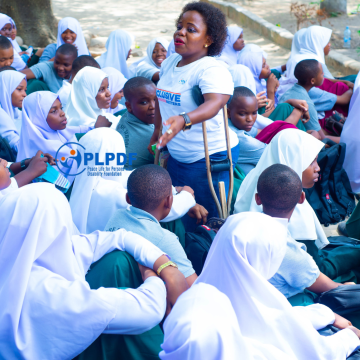Hedhi Salama
Empowering Girls with Disabilities for a healthier and Dignified Menstrual Experience
Menstruation is a natural process, yet many girls especially those with disabilities face significant challenges, including lack of access to menstrual hygiene products, inadequate knowledge about menstrual health, and social stigma. Hedhi Salama is a program by Peace Life for Persons Living with Disabilities Foundation (PLPDF) that aims to educate, empower, and support girls with disabilities to manage their menstrual health safely and with dignity.

OBJECTIVES
Providing education on menstrual health, hygiene, and self-care. Distributing sanitary pads to girls in need. Addressing menstrual stigma by fostering open discussions. Enhancing school environments to support menstrual hygiene needs. Engaging stakeholders (schools, parents, policymakers) in sustainable solutions.
KEY FOCUS AREAS
Menstrual Health Education. The menstrual cycle and its biological importance. Proper menstrual hygiene management (MHM). Addressing myths and misconceptions about menstruation Distribution of Menstrual Hygiene Product. Breaking the Stigma & Empowering Girls.
HOW WE IMPLEMENT THE PROGRAM
Partnering with schools and community centers to organize awareness sessions.
Conducting training workshops for students, teachers, and caregivers.
Distributing hygiene kits, including sanitary pads and hygiene guides.
Gathering feedback and conducting impact assessments for continuous improvement.
WHY THIS PROGRAM MATTERS
One in ten (10) girls in Africa misses class sessions due to menstruation.
Most of the girls with disabilities face increased challenges in accessing menstrual products and hygiene education.
Schools often lack proper sanitation facilities, making it difficult for girls to manage their periods safely.
OBJECTIVES
Providing education on menstrual health, hygiene, and self-care. Distributing sanitary pads to girls in need. Addressing menstrual stigma by fostering open discussions. Enhancing school environments to support menstrual hygiene needs. Engaging stakeholders (schools, parents, policymakers) in sustainable solutions.
Partnering with schools and community centers to organize awareness sessions.
Conducting training workshops for students, teachers, and caregivers.
Distributing hygiene kits, including sanitary pads and hygiene guides.
Gathering feedback and conducting impact assessments for continuous improvement.